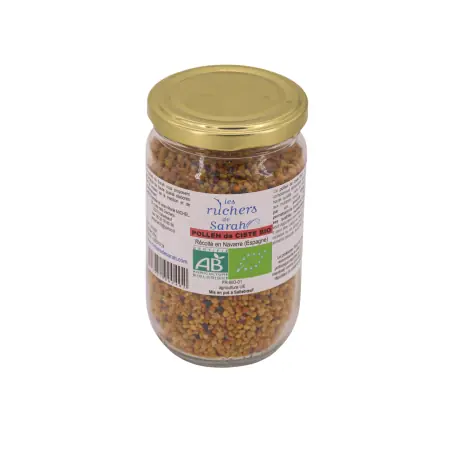














Freeze-dried cistus pollen
Certified organic
Jar of 220g
🟡 This freeze-dried cistus pollen, certified organic and enriched with propolis, is a high-quality food: it is an exceptional dietary supplement.
Freeze-dried using a delicate process that preserves its nutritional qualities intact, it will provide well-being and vitality.
- One to three tablespoons per day are sufficient, especially during seasonal changes.
- For perfect assimilation, we recommend thoroughly mixing the pollen with your saliva before ingesting it, or it can be diluted with a little water.
- This pollen is recommended for elderly people who, due to a lack of appetite, often eat poorly, and for children to promote their growth.
NATURAL DEFENSES, PROTECTION
Cistus pollen is naturally rich in vitamins B2 and B3, which contribute to the maintenance of normal mucous membranes. 60 to 70% of the immune system is located around the intestinal system. Therefore, improving the digestive system leads to an enhancement of natural defenses.
Cistus pollen is naturally rich in vitamin B9 and is a source of vitamin B6, iron, zinc, and selenium, which contribute to the normal functioning of the immune system.
INTELLECTUAL AND PHYSICAL VITALITY
Cistus pollen is naturally rich in vitamin B2 which contributes to the reduction of fatigue and to a normal energy metabolism.
In case of persistent fatigue and/or intestinal disorders. Also recommended in the preparatory phase for professional or amateur athletes.
Like other types of pollen, it also contains polyphenols, carotenoids, and lacto-ferments that contribute to the regulation of intestinal function, support natural defenses, and protect against oxidation.
🟡 To learn more about the benefits of pollen, check out our blog articles:
Packaging: Packaging: 220 g glass jar
No coloring or preservatives.
Origin: Aragon (Spain)
Ces produits pourraient vous intéresser